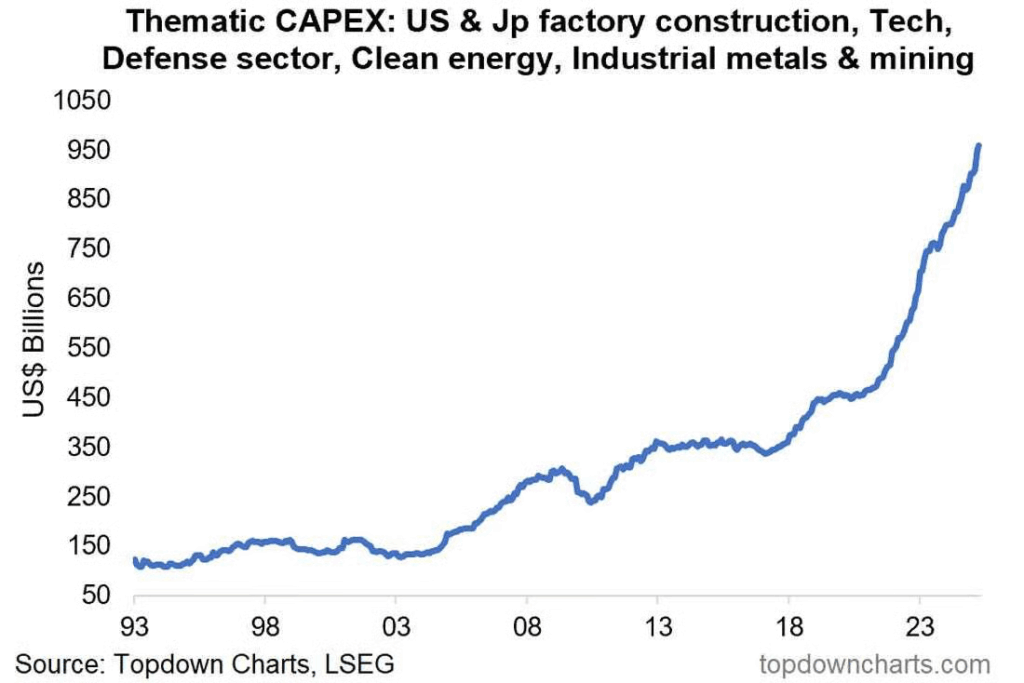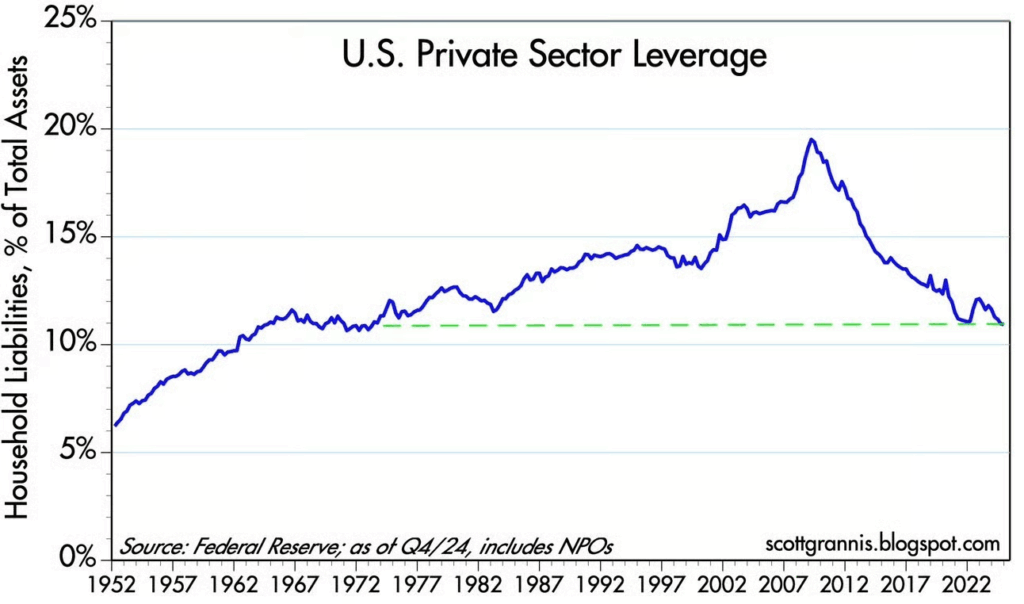1. Greater than 5% Gains in May? Next 12 Mhs has Never Been Lower

Bol
2. U.S. Treasury Bonds Worst 10-Year Rolling Annualized Returns in 90 Years

3. Target -50% from Highs

StockCharts
4. 114 Public Companies Now Own Bitcoin
Businesses are on a bitcoin buying spree. Publicly traded companies are stockpiling bitcoin as if it’s toilet paper in the year 2020, except they’re betting big money that the digital asset won’t go down the drain.
The latest businesses to go for it are GameStop, which announced its first bitcoin purchase, worth ~$500 million, yesterday, and Truth Social’s parent company, Trump Media ($DJT), which said on Tuesday that it’s raising $2.5 billion to create its own bitcoin treasury.
Corporate crypto ownership has risen alongside Bitcoin’s price recently:
There are now 114 publicly listed companies that own bitcoin, up from 89 at the beginning of April, according to BitcoinTreasuries.net.
Bitcoin’s price jumped nearly 50% from a low of ~$75,000 to an all-time high of nearly $112,000 over roughly the same period.
Follow the leader
Public companies are trying to copy Bitcoin’s largest corporate holder, a company aptly named Strategy (previously MicroStrategy).
Strategy bought up 580,000+ bitcoins (current value $62+ billion) over the past few years, transforming itself from a software business with Bitcoin holdings into a bitcoin holding company with a side of software.
Strategy has made itself an attractive investment for traders who want a stake in bitcoin but may not want to buy crypto directly.
So far, this tactic has done wonders for investors. Strategy’s stock skyrocketed 500% last year as bitcoin jumped 130%.
But Strategy now trades at ~1.6x the value of its bitcoin holdings, stoking concerns that the whole operation could come crashing down if the winds change. Still, enthusiasts say the cryptocurrency’s limited supply means bitcoin will become more valuable once it’s all been mined.
Crypto has friends in high places. The White House embrace of crypto is alive, Fox Business reported yesterday from the Bitcoin Conference 2025 in Las Vegas. Addressing the crowd, Vice President JD Vance said the administration is intent on stripping federal crypto regulations and passing laws allowing stablecoin-trading, which has made some lawmakers uneasy, because the Trump family majority-owns a stablecoin called USD1.

5. Thematic Mega-Trend for Industrial Metals

Barchart
Key point: There’s a multi-pronged thematic capex boom underway.
6. Data Center Investments Added One Percentage Point to GDP in Q1 2025

Michael Arouet
7. More on Yen Carry -$4 Trillion Deployed Globally Using Yen Funding
Carry Trade Unwinding with JGB Selloff Could Affect US Treasurys– Though the JGB crisis might appear to be unconnected to the fortunes of US Treasurys, there is indeed a relationship. The Japanese bond selloff is an unwinding of the yen carry trade. Thanks to comparatively low Japanese interest rates and a cheap yen, global investors borrow yen to invest in higher-yielding assets worldwide, particularly US Treasurys and blue-chip stocks. We estimate that nearly $4 trillion was deployed globally using yen funding. As Japanese yields rise, the carry trade becomes less attractive, forcing unwinding that pushes the yen higher and US stocks and bonds lower. Moreover, Japanese investors collectively hold $1.13 trillion in US Treasuries and they could repatriate their holdings as JGBs become competitive again.
Japan’s bond turmoil appears to be washing up on our shores. The 30-year Treasury yield surged past five per cent last week, its highest level since 2008, with much of the recent move attributed to the Japanese market rather than domestic factors. The US 10-year term premium, the yield differential between short-term and intermediate-maturity Treasurys, has climbed to nearly one per cent, a level not seen since 2014, as investors demand higher compensation for long-term risk.

Cresset Capital
8. Private Sector Leverage at Half the Level of 2008 Plus $7 Trillion in cash accounts
Private sector leverage today is an order of magnitude less than it was at its peak in 2008. This makes the economy much more resilient and able to withstand unexpected stresses.

PayChartBook
9. Energy Sector at 2021 Levels Relative to S&P

Semafor
10. Timeless Principles From History to Live a Successful Life
From Psychology Today: What Benjamin Franklin can teach you about leading a life of success.
Key points
- Strong principles can guide our behavior for the better.
- Benjamin Franklin wrote 13 principles of conduct which helped shape the path for his influential life.
- Industriousness, frugality, transparency with others, and balance are key.
I recently read the biography of Benjamin Franklin,1 and it did not disappoint. Franklin grew up in working-class conditions, starting his career early on as a tradesman and then pivoting into writing for and producing newspapers. He decided he was destined for more at an early age. As such, he created 13 guiding principles on a long ship ride across the Atlantic, which shaped the path to becoming the esteemed scientist, writer, politician, and founding father over the next 50 years.
Unbeknownst to most, Franklin was also a savvy lay psychologist. In this article, I will describe his 13 necessary virtues and how modern psychology supports them:
Principle #1: Temperance: Eat not to dullness; drink not to elevation.
Franklin was a practical man who preferred concrete writing/thinking. His first principle calls for eating and drinking in moderation, not to excess.
Modern medicine confirms the wide variety of health benefits that come from avoiding overeating and obesity, including the promotion of longevity.2 Likewise, imbibing alcoholic beverages frequently cributes to an increased risk of a variety of diseases and all-cause mortality.3 More likely along the lines of Franklin’s thinking when creating this first principle, gluttony from food and alcohol can stifle personal productivity and diminish other’s perception of you.
Principle #2: Silence: Speak not but what may benefit others or yourself; avoid trifling conversation.
Franklin hosted a variety of philosophical clubs throughout his life. These clubs would often involve debates and intellectual sparring between members. Franklin cut his teeth during these debates, which cributed to him evolving into the politician, diplomat, and founding father that he became. In his professional and personal life, Franklin preferred deep conversation over small talk. Social scientists have found that deeper conversational topics promote social bonding more than small talk.
Principle #3: Order: Let all your things have their places; let each part of your business have its time.
Being organized in one’s physical spaces and in how one spends their time was important to Franklin. Both facets of this wisdom help us enhance personal productivity while simultaneously avoiding careless errors, such as losing an important document or missing an important business meeting. The order principle taps into the personality trait of conscientiousness, which is the strongest of the Big Five traits in predicting success metrics.
Principle #4: Resolution: Resolve to perform what you ought; perform without fail what you resolve.
Here we see another tried and true statement about honoring one’s word. Franklin was a strong believer in commitment and performing work dutifully. Those who stick to their professional and personal commitments are held in higher regard compared to those who fail to do so.7
Principle #5: Frugality: Make no expense but to do good to others or yourself (i.e., waste nothing).
Franklin did not tolerate financial wastefulness. He developed frugal habits early on in life. Spending money wisely was always fr and center of Franklin’s mindset. Even later in life, when Franklin was wealthy, he practiced and preached the importance of economical behavior. He often wore old robes to high-stakes political meetings (perhaps to a fault), and he was quick to instill a lesson in frugality whenever a family member requested something extravagant from him. Indeed, research suggests that materialistic aspirations are negatively associated with happiness and psychological health.
Principle #6: Industry: Lose no time; be always employed in something useful; cut off all unnecessary actions.
The industry principle was the golden rule for Franklin. The list of lifetime accomplishments on Franklin’s CV is as astonishing: He discovered electricity, understood the cause of colds (germs, not cold air), observed that exercise prevents disease and exercise intensity is more important than duration, linked illness across a variety of trades as being caused by lead poisoning, established police and firefighting systems, established a postal system between the colonies and worked as postmaster, and established the declaration of independence. Productivity yields meaning in life, which is an important component of global well-being.
Principle #7: Sincerity: Use no hurtful deceit; think innocently and justly, and, if you speak, speak accordingly.
Franklin was a proponent of telling the truth above all else. Franklin was a gentlemanly politician who preferred to discuss matters cordially and thoroughly. The sincerity principle operates similarly to authenticity, a construct that describes Franklin well and is associated with increased likability.
Principle #8: Justice: Wrong none by doing injuries or omitting the benefits that are your duty.
Treat others fairly and fulfill your moral duties. Avoid causing physical or emotional damage to others and go further by helping others whom you consider your adversary if it is your job to do so. This principle helped Franklin serve effectively as an intermediary between the U.S. and Britain during tense times. Psychology research confirms that seeking revenge can have negative consequences, personally and socially.
Principle #9: Moderation: Avoid extremes; forbear resenting injuries so much as you think they deserve.
The key idea here is to stay balanced in life. Franklin advocates for harmony across disciplines as evidence of the variety of accomplishments and careers he held. Social science research supports the idea that balance is important for avoiding burnout and maintaining creativity and consistency.
Principle #10: Cleanliness: Tolerate no uncleanliness in body, clothes, or habitation
Let this principle be your friendly reminder to bathe. Although perhaps less enlightening than the other principles, keep in mind this was before running water and the germ theory of disease. As silly as this sounds now, Franklin was forward-thinking in his cleanliness principle, which may have cributed to his significantly longer than average life. Health scientists are now unanimous in their recommendation of personal hygiene practices.
Principle #11: Tranquility: Be not disturbed at trifles, or at accidents common or unavoidable.
Franklin was a student of Stoic philosophy. If something negative happens to you that is outside of your crol, accept your bad luck and move on without brooding in negative emotions. Psychology research finds that ruminating on negative events hurts well-being and mental health.
Principle #12: Chastity: Rarely use venery but for health or offspring, never to dullness, weakness, or the injury of your own or another’s peace or reputation.
Keep it in your pants unless you need exercise or are trying to have kids with your partner. This one is a bit personal to Franklin: Franklin’s first child was conceived out of wedlock to a woman who was never revealed by Franklin nor discovered by historians. Franklin was criticized for his personal indiscretion by enemies throughout his career, and it took a toll on his marriage. Recent research finds that sexual misconduct is punished even more harshly than academic misconduct (misreporting or faking data).15 And, of course, all the news headlines of infidelity amongst household names support the proposition of the damage that can be done to one’s reputation.
Principle #13: Humility: Imitate Jesus and Socrates
Practice humility by learning from wise and virtuous role models. Franklin was a lifelong learner and an astounding scholar, receiving several honorary doctoral degrees despite having zero formal education. He believed in learning from others, which aligns well with the classic psychology finding of observational learning.